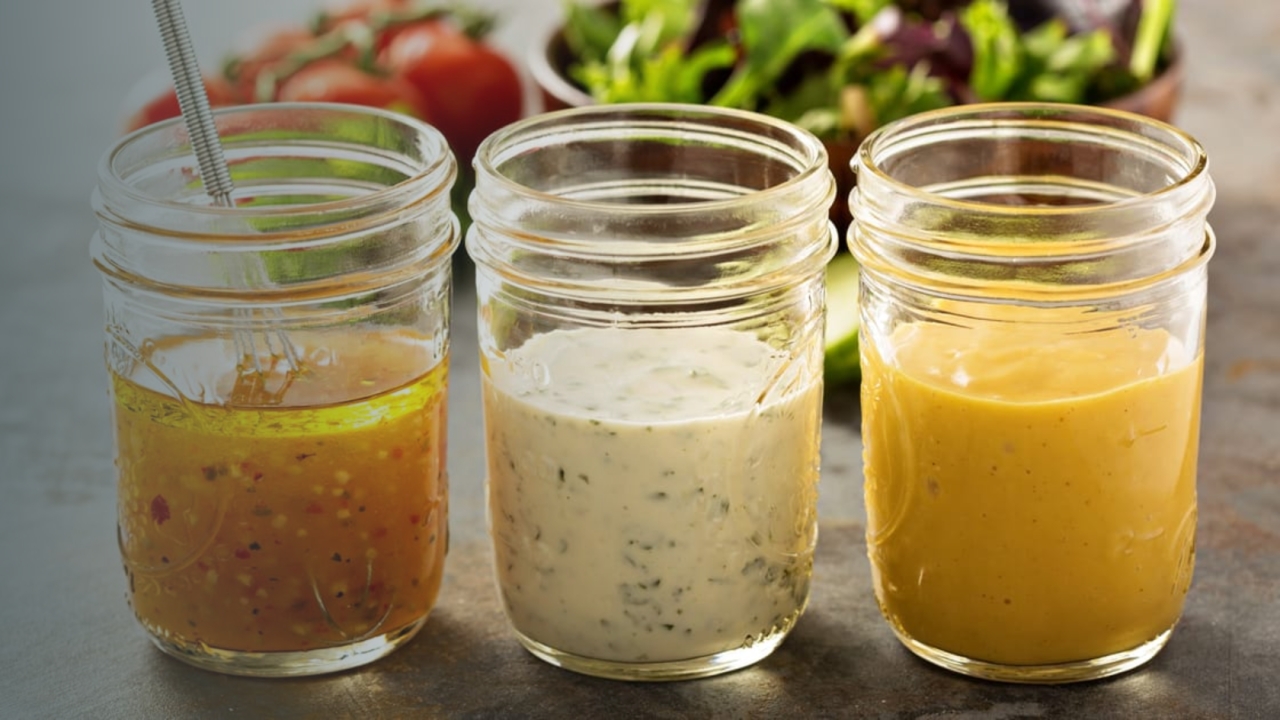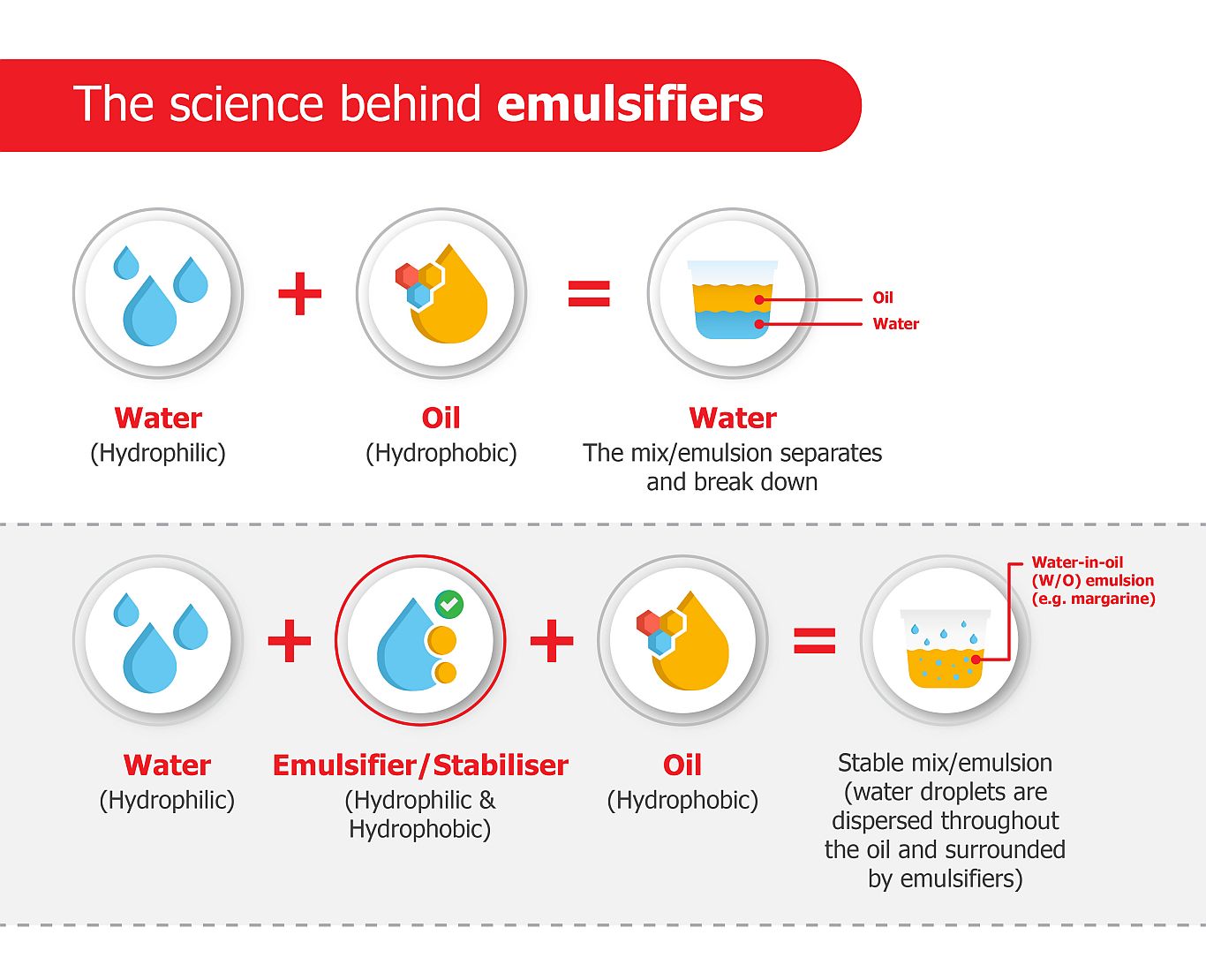What Are Emulsifiers Doing in My Salad Dressing?
Wiki Article
The Science Behind Emulsifiers and Their Significance in Modern Manufacturing
Emulsifiers play a crucial function in contemporary production, working as the unhonored heroes that blend oil and water for a wide variety of items. You might not recognize exactly how these compounds enhance structure and security, but their impact is considerable across markets. As consumer preferences change in the direction of cleaner labels, the need for cutting-edge emulsifiers is expanding. What does this mean for the future of product solution? Let's explore further.What Are Emulsifiers?
Emulsifiers are vital representatives in the globe of food and product production, acting as the glue that binds 2 or else immiscible liquids, like oil and water. Usual instances consist of lecithin found in egg yolks and soybeans, and mono- and diglycerides utilized in various refined foods.
When you whip up a salad clothing or delight in a luscious treat, emulsifiers aid maintain that ideal appearance. Without emulsifiers, numerous foods would separate, leading to undesirable appearances and tastes.
The Chemistry of Emulsification
When you blend oil and water, you might notice they don't mix quickly; that's where the chemistry of emulsification enters play. Emulsification takes place when tiny droplets of one liquid disperse in another, producing a stable combination. This occurs because oil and water are immiscible as a result of their varying polarities-- water is polar while oil is non-polar. To overcome this difficulty, emulsifiers are employed.These particles have a hydrophilic (water-attracting) head and a hydrophobic (water-repelling) tail. When you include an emulsifier, its molecules position themselves at the oil-water user interface, minimizing surface stress and enabling the droplets to mix. The emulsifier forms a safety layer around each bead, avoiding them from integrating back into different layers. Comprehending this chemistry is essential for achieving security in products like dressings, lotions, and sauces, making emulsification vital in modern-day manufacturing.
Kinds of Emulsifiers
Different kinds of emulsifiers play crucial roles in stabilizing blends of oil and water. You'll frequently experience two primary groups: natural and synthetic emulsifiers. All-natural emulsifiers, like lecithin from egg yolks or soy, are derived from plants and pets, making them preferred in food. They're typically thought about safer and healthier alternatives.On the various other hand, synthetic emulsifiers, such as mono- and diglycerides, are chemically crafted to boost security and service life. They're generally made use of in refined foods and cosmetic items.
Furthermore, you could stumble upon non-ionic, anionic, and cationic emulsifiers, each with special residential properties that influence their efficiency. Non-ionic emulsifiers, for example, job well in a vast array of pH levels, while anionic emulsifiers often tend to execute better in alkaline problems. Comprehending these kinds can help you pick the ideal emulsifier for your specific application.
Mechanisms of Solution Development
Understanding exactly how emulsions form is necessary for producing steady mixes of oil and water. When you introduce an emulsifier, it decreases the surface stress between the two fluids, permitting them to blend more quickly.The emulsifier molecules have a hydrophilic (water-attracting) head and a hydrophobic (oil-attracting) tail. When you add an emulsifier, these molecules prepare themselves at the oil-water interface. The hydrophilic heads engage with water, while the hydrophobic tails secure right into the oil. This produces a barrier that supports the droplets, preventing them from integrating.
Applications of Emulsifiers in Various Industries
Emulsifiers play a crucial function throughout numerous industries, making your preferred foods smoother and extra pleasurable. In cosmetics, they improve item appearance and security, ensuring a positive application experience. Plus, in drugs, they assist deliver essential active ingredients properly, enhancing total efficacy.Food Industry Uses
While you may not recognize it, emulsifiers play an important function in the food industry, enhancing the appearance, stability, and rack life of lots of products (Emulsifiers). They're frequently found in salad dressings, sauces, and mayo, assisting to mix oil and water for a smooth, consistent item. In baked goods, emulsifiers enhance dough handling and preserve moisture, leading to a much better appearance and extended freshness. They're likewise crucial in dairy products, where they stabilize solutions in creams and ice creams, protecting against separation. Even in snacks, emulsifiers aid maintain crunchiness and avoid stale tastes. By making sure harmony and top quality, emulsifiers are significant to providing the delicious products you enjoy other each day, making them a crucial active ingredient in contemporary food manufacturing.Aesthetic Formulas Benefits
When it pertains to cosmetic formulations, emulsifiers are vital for producing products that feel elegant and perform effectively. They aid mix oil and water, making certain a smooth and secure uniformity in creams, creams, and products. You'll observe that emulsifiers enhance item stability, avoiding separation and lengthening rack life. This implies you can enjoy your preferred moisturizer without stressing over it going poor too swiftly. Furthermore, emulsifiers enhance the application experience, enabling for even circulation and much better absorption into the skin. By making use of emulsifiers, you likewise attain an even more appealing appearance, making your cosmetics really feel delightful on your skin. Generally, emulsifiers play an essential role in providing premium cosmetic items that satisfy your beauty requirements.Drug Applications Summary
In the pharmaceutical sector, emulsifiers are important for developing reliable medications. They assist develop stable mixes of oil and water, making certain that active ingredients are uniformly dispersed and quickly taken in by the body. You'll find emulsifiers in numerous dose forms, like creams, ointments, check this site out and liquid suspensions, improving the bioavailability of medicines. They additionally improve the texture and stability of products, making them more attractive and much easier to make use of.The Impact of Emulsifiers on Item Quality

By making sure steady emulsions, you minimize the threat of perishing and extend shelf life, ultimately saving you money and time. You'll also discover that emulsifiers can enhance the bioavailability of energetic components in your items, making them extra efficient for customers.
Moreover, they enable you to create innovative formulations that meet diverse customer needs. Whether you're crafting a creamy dressing or an elegant lotion, emulsifiers are important for achieving the desired results. Basically, by understanding and leveraging the impact of emulsifiers, you can significantly elevate the quality of your items.
Future Fads in Emulsifier Growth
As the need for cleaner labels and sustainable items climbs, the advancement of new emulsifiers is readied to advance substantially. You'll observe a shift towards plant-based and all-natural emulsifiers, driven by consumer preferences for components that are ecologically friendly and less refined. Technologies in biotechnology will likely improve the capability and performance of these emulsifiers, enabling from this source producers to develop steady formulations with less additives.
You might also see a boost in multifunctional emulsifiers that not only maintain emulsions but likewise enhance flavor, texture, or dietary value. This fad might streamline component lists while boosting product efficiency.
Additionally, with advancements in nanotechnology, emulsifiers can be engineered at the molecular degree to achieve extraordinary stability and performance. Emulsifiers. As you check out these fads, you'll discover that the future of emulsifier growth is not practically functionality, yet also regarding welcoming sustainability and transparency in active ingredients
Frequently Asked Questions
Are Emulsifiers Safe for Intake in Food Products?
Yes, emulsifiers are typically secure for consumption in food products. They have actually been thoroughly examined and accepted by food safety authorities, so you can appreciate your favored foods without bothering with their effect on your health.Can Emulsifiers Be Derived From All-natural Resources?
Yes, you can obtain emulsifiers from all-natural resources. Ingredients like lecithin from egg yolks or soybeans and casein from milk are typical. These all-natural emulsifiers aid stabilize blends without synthetic ingredients, making them preferred in various items.
Exactly How Do Emulsifiers Impact Service Life of Products?
Emulsifiers stabilize mixtures, stopping separation and wasting - Emulsifiers. By maintaining harmony, they extend products' rack life, guaranteeing quality and quality. You'll observe that emulsifiers aid keep your preferred foods and cosmetics performing more than timeWhat Are Potential Negative Effects of Emulsifiers?
You could experience gastrointestinal concerns when consuming items with emulsifiers, as they can disrupt digestive tract bacteria. Some research studies recommend potential links to swelling or allergic reactions, but much more study is required to fully recognize these effects.
Exist Alternatives to Standard Emulsifiers?
Yes, there are alternatives to typical emulsifiers. You can check out alternatives like natural gum tissues, starches, or lecithin. Each alternative deals one-of-a-kind properties, so experiment to discover what jobs best for your particular application.Report this wiki page